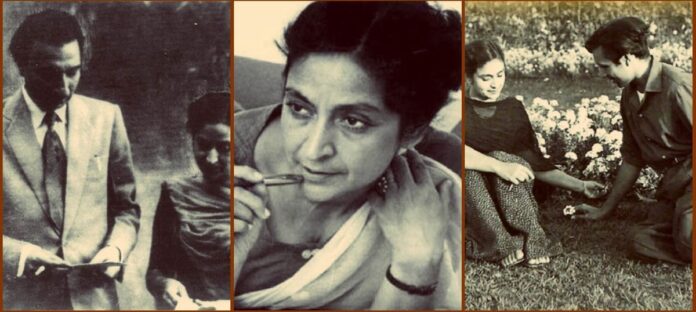
Niraj Krishna
It is difficult to delve into the complexities of love every day. Love is not merely about being together; it is not just about attaining love, and it certainly is not just the union of two bodies. Love can exist without any conditions. Such was the unique love between Sahir, Amrita, and Imroz, where Sahir and Amrita shared a platonic love, while Imroz and Amrita’s love remained ‘unsaid,’ where both were together yet so free that neither claimed ownership of the other.
Amrita, sipping Sahir’s leftover cigarettes, would feel the touch of his fingers, reliving centuries of love in a single moment. Imroz and Amrita, on the other hand, experienced a love so profound that even in separate rooms, they found everything in the fragrance of each other and the fulfillment of ‘being,’ without making any claims.
Amrita referred to her love for Sahir as platonic, where love is given without expecting anything in return, honoring the other person and allowing them to be happy. It is a love without reasons, without any pressure or obligation, yet it is love.
After parting ways with Sahir, Amrita worked as a broadcaster on All India Radio. Imroz, a talented artist, would drop Amrita to her office on his scooter daily. While on the way, Amrita would write something on his back. The words she wrote were always about Sahir. However, their relationship never faced any tension or discomfort. Such lovers are rare in the world, perhaps almost nonexistent.
Amrita understood the seven years’ age difference between her and Imroz. In one of her poems, she says, “Why did I meet you in the evening of life? If we were meant to meet, it should have been in the afternoon.” When Imroz and Amrita decided to live together, she told him, “Once you travel the whole world, and if you still choose me, I won’t have any objection. I’ll be waiting for you here.” In response, Imroz circled the room seven times and said, “It’s done now.” Imroz saw the whole world around Amrita, and for Amrita, Imroz was everything. Amrita, who had seen a dreamy man wandering in search of the woman of his dreams since childhood, couldn’t be for anyone else. And who else could have so much love for Amrita in their hearts? Before leaving this world, Amrita had understood this truth, which is why her last poem, ‘I will meet you again,’ was dedicated only to Imroz.
Imroz was a professional painter. He was quite famous for his splendid artwork. After coming to Delhi from his village, Imroz lived in the same colony where Amrita resided. Amrita and Imroz first met in 1957 when Amrita needed him to design the cover of her book. After an initial friendship, their relationship deepened. They started a literary magazine called ‘Nagmaani,’ which ran for three years and then had to be discontinued. Through this magazine, they encouraged the youth. There was a silent understanding between Amrita and Imroz that lasted a lifetime, and it was never explicitly expressed. Their relationship became so significant that the world kept watching.
One day, Imroz received an invitation from Mumbai to meet Guru Dutt. When Imroz shared this news with Amrita, she wrote, “It feels like something is slipping away from me. Once Mumbai took away my Sahir, and now it’s taking you for the second time.” Tears welled up in her eyes. She placed a newspaper over her eyes so that no one would see. Imroz did not feel comfortable in Mumbai, and within a few months, he returned to Delhi. They maintained a continuous dialogue through letters, and Imroz named the heroines in the books after Amrita.
Once, Imroz shared an incident about his meeting with Amrita Ji. He mentioned that when Amrita visited his home, the door was closed. When Imroz opened the door upon her knocking, Amrita didn’t enter despite the door being open. She just said, “Imroz, will you have to knock on your own door too?” After that, Imroz never closed the door of his house. In 1964, they decided to live together, a decision that challenged societal norms. However, they paid no heed to society’s judgment and were busy building a new way of life together.
Even when they started living under the same roof, the door of Imroz’s room was always open. Amrita’s room welcomed the breeze whenever she wanted, and it bid farewell when she pleased. Amrita had a great love for tea, and this passion would often transform into a demand while she was engrossed in her reading. Imroz, understanding the desires of her heart, would silently get up, prepare tea, and place it on Amrita’s table without making a sound, then leave without a trace. Often, Amrita wouldn’t even look up, lost in her writing. In those moments, a smile would be the only expression on her face. For that smile, those who yearn for love live and die.
The live-in relationship that we are witnessing today had its foundation laid by Amrita in 1966. Though criticism was inevitable, it never affected their relationship or their lives. During that time, when Amrita decided to live with Imroz, society raised numerous objections. In 1964, when Amrita and Imroz started living together, they faced criticism for breaking societal norms. It was a time when cohabitation without marriage was not socially accepted. Both of them, however, were undeterred. Amrita lived life on her own terms.
Their love, unconditional and selfless, became immortal. Every woman desires such elements in her love story – a feeling that makes it complete, without the need for words between the partners.
Imroz once told Amrita, “You are my society.” When society questioned Amrita about breaking its norms, she responded, “We have strengthened the bonds of love. When the foundation of marriage is love, what social norms or bonds have we broken? We have lived this relationship with body, mind, actions, and words, which perhaps many couples cannot achieve. We have faced every difficulty, and we have lived this relationship together, united and true.”
No one claims ownership through tears. Those who truly own something don’t let tears speak for them. Sahir and Imroz, expressing their relationship, said to Amrita, “Sahir is the sky for my life, and Imroz is the roof of my home.” Even with boundless love for Imroz, if Amrita couldn’t forget her love for Sahir, it might be because women never bid farewell to their share of joys and sorrows. Another reason could be that, despite her strong and rebellious nature, she continued to live her life with her first husband, Preetam, or Preetam Kaur, throughout her life.
Her love was spiritual, i.e., platonic, allowing freedom. Despite living in separate rooms under the same roof and being dependent on each other, there was no complaint, expectation, or claim. Imroz knew that Amrita loved Sahir boundlessly, but he was quite comfortable with it.
In love, a woman may become like nectar, but finding a lover like Imroz today is impossible. A man’s heart cannot be so vast that the one he desires is madly in love with someone else, yet he chooses to spend his life in unrequited love, such was Imroz’s devotion to Amrita. Being Imroz was not easy, and I chose to be Imroz in love.
Amrita-Sahir-Imroz… Even though it forms a triangle, it does not appear triangular. What a strange thing. Who has woven its corners so tightly that they do not prick anyone? What was it? Imroz says – Sahir was her love; how could I deny that? I did not have the strength to throw away what she had kept in her heart for years. Perhaps true lovers do not possess such strength. He just surrenders everything with closed eyes, letting the other person do as they please.
They lived together for 40 years, but they never attempted to label their relationship. For Amrita, Imroz was a ‘Jeet ‘ and she fondly called him by that name. In her final days, when Amrita was struggling with illness, Imroz did not leave her bedside for many days. Imroz loved Amrita so much that he even wrote a book called ‘Amrita Ke Liye Nazm Jari Hai,’ which was published in 2008.
The poet and artist, Imroz, and the renowned writer, Amrita Pritam, shared a transcendental love beyond worldly relationships, a love they neither bound in any formal relationship nor named for the world. In reality, there were not two individuals named Amrita Pritam and Imroz; they were not just two names. Imroz’s name cannot be taken separately; it will come up in the mention of Amrita, and similarly, Amrita Pritam’s name is inseparable from Imroz. With Imroz’s demise today, this unique love story has been recorded in history.
Every woman desires to be or is immersed in love like Amrita, but not everyone gets an Imroz, perhaps because being Imroz is not easy. Especially in our social structure, it is quite a challenging task for a man. To love such a woman and spend life in that love, knowing that she does not belong to you, requires a special kind of strength. Imroz knew this well. Accepting the incomplete and embracing it wholeheartedly can be done only by the one who has experienced the blindness in the language of worldly love. But that is also what love is.
If love has a word, Amrita had embedded it in the ink of her pen. If it is a melody, it remained a permanent note in Amrita’s life. The way Amrita told Imroz that if Independence Day could take someone’s form, it would be you. Similarly, if love takes someone’s form, it would be like Amrita.
Once, when the television channel asked about their relationship with Sahir and Imroz, they said, ‘There is only one relationship in the world – the yearning, the hiccup of separation, and the music of the flute, which is audible even in the hiccup of separation. This relationship was with Sahir, and it is with Imroz today.’ Explaining love is not really the easiest thing in the world, right? Being Sahir is easy; it is difficult to become Imroz in love.”
As for the ones who left the unsmoked cigars of Sahir, perhaps Amrita is still somewhere burning silently. Maybe Imroz is sitting alone in solitude, preserving the fragrance of Amrita. Farewell, Imroz! You sprinkled the cool drops of love in this burning world! And today, you have returned to Amrita. Love never dies; it becomes divine.
‘Unspoken tale of love, never to be told. / The dumb parrot chirps, eats, and smiles.’ (Sufi Saint Sheikh Farid)


